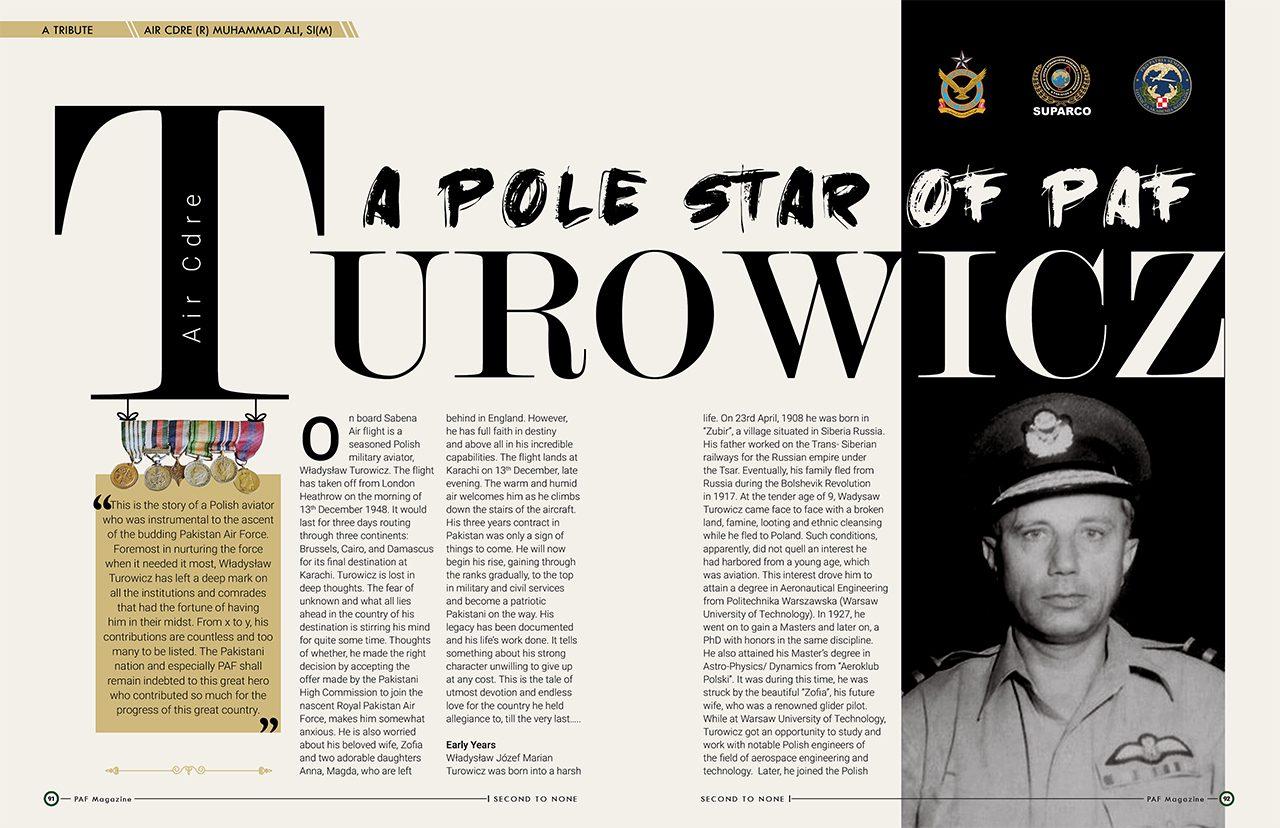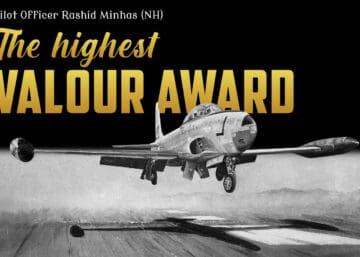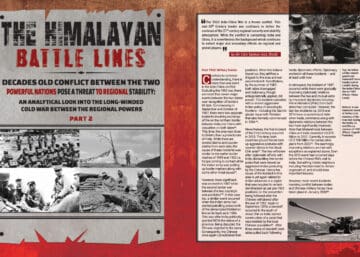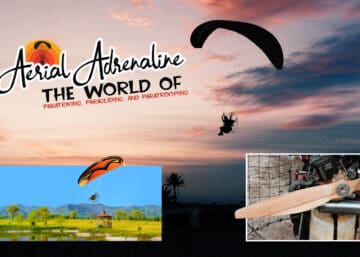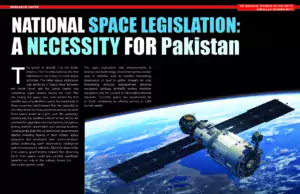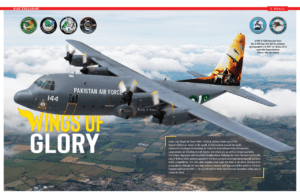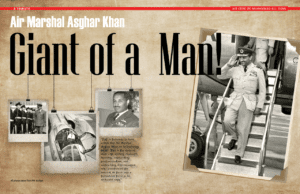This is the story of a Polish aviator who was instrumental to the ascent of the budding Pakistan Air Force.Foremost in nurturing the force when it needed it most, Władysław Turowicz has left a deep mark on all the institutions and comrades that had the fortune of having him in their midst. From x to y, his contributions are countless and too many to be listed. The Pakistani nation and especially PAF shall remain indebted to this great hero who contributed so much for the progress of this great country.
On board Sabena Air flight is a seasoned Polish military aviator, Władysław Turowicz. The flight has taken off from London Heathrow on the morning of 13th December 1948. It would last for three days routing through three continents: Brussels, Cairo, and Damascus for its final destination at Karachi. Turowicz is lost in deep thoughts. The fear of unknown and what all lies ahead in the country of his destination is stirring his mind for quite some time. Thoughts of whether, he made the right decision by accepting the offer made by the Pakistani High Commission to join the nascent Royal Pakistan Air Force, makes him somewhat anxious. He is also worried about his beloved wife, Zofia and two adorable daughters Anna, Magda, who are left behind in England. However, he has full faith in destiny and above all in his incredible capabilities. The flight lands at Karachi on 13th December, late evening. The warm and humid air welcomes him as he climbs down the stairs of the aircraft. His three years contract in Pakistan was only a sign of things to come. He will now begin his rise, gaining through the ranks gradually, to the top in military and civil services and become a patriotic Pakistani on the way. His legacy has been documented and his life’s work done. It tells something about his strong character unwilling to give up at any cost. This is the tale of utmost devotion and endless love for the country he held allegiance to, till the very last…..
Early Years
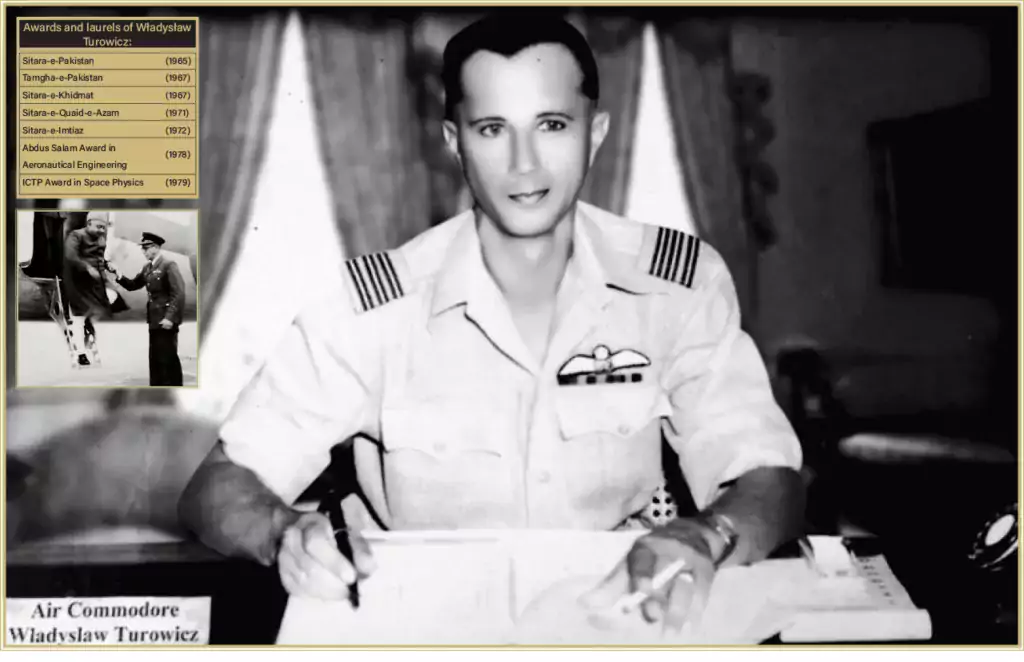
Władysław Józef Marian Turowicz was born into a harsh life. On 23rd April, 1908 he was born in “Zubir”, a village situated in Siberia Russia. His father worked on the Trans- Siberian railways for the Russian empire under the Tsar. Eventually, his family fled from Russia during the Bolshevik Revolution in 1917. At the tender age of 9, Wadysaw Turowicz came face to face with a broken land, famine, looting and ethnic cleansing while he fled to Poland. Such conditions, apparently, did not quell an interest he had harbored from a young age, which was aviation. This interest drove him to attain a degree in Aeronautical Engineering from Politechnika Warszawska (Warsaw University of Technology). In 1927, he went on to gain a Masters and later on, a PhD with honors in the same discipline. He also attained his Master’s degree in Astro-Physics/ Dynamics from “Aeroklub Polski”. It was during this time, he was struck by the beautiful “Zofia”, his future wife, who was a renowned glider pilot. While at Warsaw University of Technology, Turowicz got an opportunity to study and work with notable Polish engineers of the field of aerospace engineering and technology. Later, he joined the Polish Air Force as an aeronautical engineer and a test pilot. When WW-II broke out in Sep 1939, his unit was given orders to disable their aircraft (in order to prevent their use by the enemy), and to cross over to Romania, which at that time was a neutral country. There the allied forces interned them, and eventually filtered out most of them to allied countries in Europe. Turowicz along with others made his way to France, where they regrouped under the command of General Sikorski. At that time, Władysław Turowicz and Zofia were posted in separate units, and when France fell, they made their ways separately to Great Britain. Turowicz chose the long route through North Africa, and Zofia, disguised as sailor, sailed on a fishing boat across the English Channel. In England, the Poles served in the Polish Arm of the Royal Air Force (RAF), and contributed substantially to the air defence of Britain.
He was not accepted as a fighter pilot because of weak eyesight, but he was allowed to fly transport planes and was sometimes used as a test pilot as well. Besides, he was also working in maintenance and technical departments of RAF. The new world order that followed at the end of the war in 1945 meant that Poland remained firmly entrenched in the Soviet sphere of influence. Turowicz and majority of the Poles who fought with the Allied Forces decided not to risk returning to their country under communist regime. He took up a job at the British aircraft-manufacturing set-up at Farnborough, but he always wanted to leave Britain owing to its depressing weather. Finally, his wish came true.
‘Pakistan’, It Is
Turowicz and Zofia were torn and confused after the war. They couldn’t go back to Poland and nobody wanted them in the land they had helped save. Amidst such dismal circumstances, the Pakistan high commission in London announced a need for trained Pilots for its nascent air force. Turowicz, Zofia and more than 50 Polish aviators including pilots, aircraft technicians, and aeronautical engineers opted to join and all were given 3-year contracts with handsome salaries.
Career with PAF
“Poles came to help us when we were abandoned by everyone else.” Gp Capt S. Ehtesham Naqvi of PAF remembers in a documentary on Polish aviators of PAF. The Poles could very possibly have felt the same about PAF. Of all the Polish pilots who had migrated to Pakistan, Władysław Turowicz showed the most promise. He was technically sound beyond most around him and this was prudently put to good use by PAF. He was initially based in the Technical Training Section (TTS) at Drigh Road and later commanded the No 102 Maintenance Unit. His wife, Zofia, served as a glider instructor for the Shaheen Air Cadets and played a key role in the flying training of budding flight cadets during these times. In 1950, when the contracts of the Polish personnel in RPAF expired, the majority of them moved to different countries, however, Turowicz and Zofia decided to stay as they felt very comfortable in Pakistan.
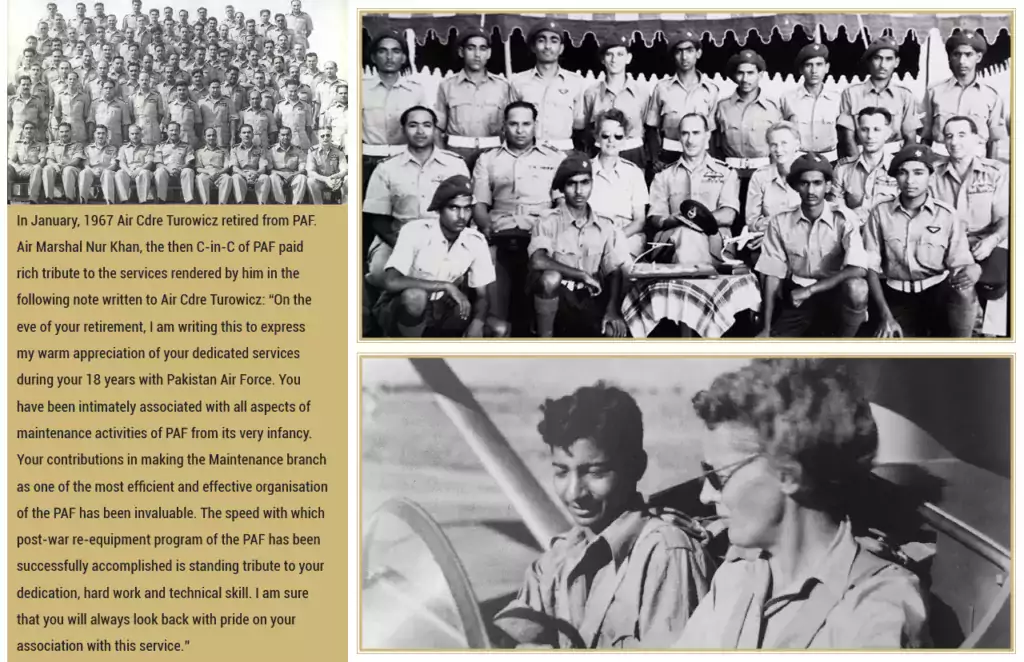
Apart from his professional immersion in the field of aeronautics, Turowicz other interests included ‘Bridge’ and “Shikar”, both of which he was able to indulge to the full. Zofia, being the Masters in Mathematics and Physics begun teaching Mathematics and other science subjects at the Karachi American School.
In 1952, Turowicz, was promoted to the rank of Wing Commander and became Station Commander of PAF Chaklala. The base at that time was a technical/ maintenance base, comprising some propeller aircraft and consisted of 1200-1500 personnel including the large number of Poles. During the same period, King Faisal II of Iraq visited Chaklala along with General Ayub Khan and inspected the smartly tuned out aviators commanded by Wg Cdr Turowicz. From 1955 to 1957, Turowicz served as Station Commander PAF, Kohat. The base at that time housed the Recruits Training School and a technical School for Non Commissioned Officers of RPAF. In 1959, he was promoted to Gp Capt and became the Staff Maintenance officer at RPAF Headquarters at Mauripur. His foresightedness and meticulous planning on this appointment, helped the RPAF in reducing the ever growing accident rates especially on fighter aircraft. In 1960 he was promoted to Air Cdre, and joined AHQ, as Assistant Chief of the Air Staff (Maintenance), one of the three ACsAS (Assistant Chief of Air Staff) reporting to the Air Force C-in-C (Commander-in-Chief). Turowicz showed his true colours while holding this appointment. Being the expert in technical/ maintenance domain, he formulated plans which subsequently became the reference guide for the modern PAF. Remaining on this appointment, he completely reorganised the maintenance protocols in air force, taking direction of centralised management of all aircraft, supplies and equipment. Prior to that each squadron has its own maintenance procedures that lacked professionalism, standardisation and coherence. He also greatly emphasised on the training of the native PAF personnel and introduced the concept of indigenisation in PAF. These concepts of self-reliance and indigenisation later paved way in establishment of PAC Kamra.
During same time, the couple was blessed with one more daughter, Alicja and a son, Marek. Finally, in 1961, the family applied for the citizenship of Pakistan and decided to raise their four children in their new home land. All their children got schooling from Karachi, the city they loved the most.
And then came the real test of the nation, and its air force, the 1965 Indo-Pak War. During the grueling war, Pakistan suffered a setback when the US halted supply of combat aircraft spare parts to Pakistan. Not one to submit to circumstances, Turowicz supervised the production of spare parts in Pakistan that paralleled the ones made in America. He ensured that aircraft readiness and turn-around time did not suffer by organising locally produced substitutes. Being at the helm of all maintenance activities during war, he made untiring efforts in keeping the PAF fleet up and running against the enemy. In recognition of his meritorious services during war, he was awarded with Sitara-e-Pakistan by President of Pakistan.
Contributions to Pakistan’s Space Program
There was not a man to be seen on the streets. It was 7th June, 1962. People were glued to their radio sets and those who had them, their TVs. It was the eve of the launch of Rehbar-1, Pakistan’s first unmanned solid-fuel sounding rocket. It was about to take its initial space flight from the Sonmiani Terminal Launch. The young nation hadn’t had this much excitement for a while. And there was cause for excitement and pride, as they waited with baited breath. Then, came the announcement. The launch was successful. A vein of merriment and pride could be felt through the nation, and with good cause. The rocket was developed in a joint venture between PAF and NASA, with PAF’s team being led by Air Cdre Turowicz and Dr. Abdus Salam. In a period of 9 months, the Pakistani team, under the leadership of Air Cdre Turowicz and Dr. Abdus Salam, had trained in the US, procured equipment, selected the payloads, constructed the rocket range at Sonmiani and launched its first rocket successfully. Pakistan had secured its distinction as the third country in Asia and the tenth in the world to conduct successful spaceflight. NASA and the organization, after observing the launch, publicly hailed the space flight program as the beginning of “a program of continuous cooperation in space research of mutual interest.”
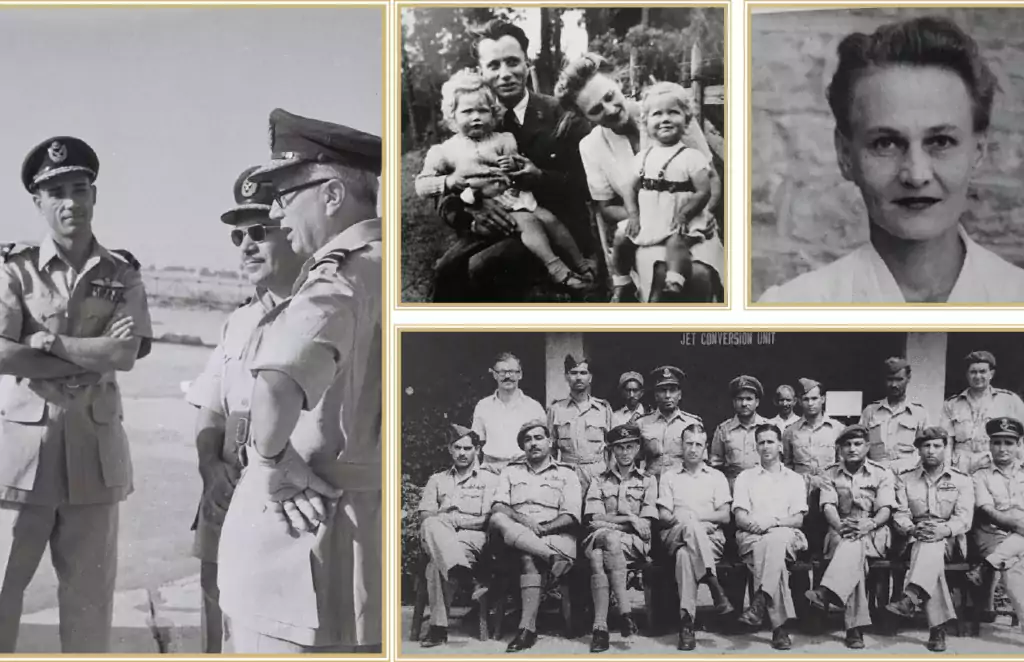
In 1966, Air Cdre Turowicz was appointed the Chief Scientist in Space and Upper Atmosphere Research Commission (SUPARCO), the national space agency of Pakistan. It was him and Dr. Abdus Salam who met with President Ayub Khan and convinced him about the significance of investing in a space program. The President in turn sent them to the US to further meet with NASA Officials. The confidence and tact that Turowicz displayed in these meetings with NASA was instrumental in persuading the Nixon administration to invest in Pakistan’s space program. Air Cdre Turowicz and Dr. Abdus Salam can be credited with the establishment of rocket fuel factories and rocket technology research institutes and labs in Pakistan.
In 1967 after formal retirement from PAF, Turowicz was appointed head of SUPARCO by President Ayub Khan. Air Cdre Turowicz justified the decision by several accomplishments to his name. After his appointment, oversaw the rapid development of Pakistan’s own weather satellite, Rehbar – 2, conceiving and developing the design himself. The satellite was launched from Sonmiani Satellite Launch Centre, which Turowicz had recently upgraded, and carried a payload of 80 pounds. The Air Cdre also oversaw the development of a Launchpad Control System, a Flight-Test Control Command and an entire division for System Engineering in SUPARCO. The Doppler Radar (Islamabad Mission Control Center) and Islamabad Ionosphere Station in Quaid e Azam University were also his endeavors. In the late 1970s, Air Cdre Turowicz dedicated his time to advance academic development space and aeronautical studies. He orchestrated the construction of an engineering institution in SUPARCO. Turowicz and his students would conduct research and publish research papers and articles on topics such as space exploration, ballistic missiles and so on. It is safe to assume that without his contributions, Pakistan would not have achieved what it has achieved today in the field of Space and Missile technology. Air Cdre Turowicz, with his close friend, the enigmatic Dr. Abdus Salam, made a duo that the entire nation should be proud of, to this day.
In recognition of his exceptional contributions at SUPARCO, he was awarded with Sitara-e-Quaid-e-Azam (1971), Sitara-e-Imtiaz, (1972), Abdus Salam Award in Aeronautical Engineering (1978), ICTP Award in Space Physics (1979).
A True Patriot
After arriving in Pakistan, Turowicz never visited Poland. However, in mid 60s, he had to visit Poland for a while for the treatment of his back which was causing tremendous pain for years. As Poland at that time was under the control of communist regime, the famous intelligence agency “Sluzba Bezpieczestwa (SB)” got after him. Several agents made insidious attempts to indoctrinate him. It seemed that SB believed Turowicz, with his access and influence in high circles back in Pakistan would prove to be an invaluable asset to the organization. Once Turowicz was asked about whether he was approached to spy for these communist spy agencies. His firm reply was, “Yes, many times! But they are slimy worthless people. Why would I? I and my family belong to this country, Pakistan.” Finally these intelligence agencies gave up on him. Recently declassified documents (as mentioned in book ‘Freedom under the Pakistani Sky’ by Anna T. Pietraszek), reveals the statement of Turowicz on this issue, “I am primarily a Pakistani officer. In Pakistan I made my career, acquired the rank of Air Commodore and was awarded with highest distinctions. If I do anything unofficially, I would consider that disloyal to my authorities and my country. Thus, I cannot accept your proposition”.
Death and Legacy
In his last years, Turowicz suffered from a come-back of a contusion connected with backbone injury incurred in a motorcycle accident in his young age before World War II. After retirement, he developed problems with movement and physical activeness. He was looked after well by his wife and daughter Anna during his last days. Finally, after long illness Władysław Turowicz died in Karachi on 8th January, 1980. The nation had lost one of most technically adept minds. He was buried with full military protocol and honor in the Christian cemetery (famously known as ‘Gora Kabristan’) at Karachi. The ceremony was attended by the Consul-General of Poland Mr. Kazimierz Maurer and high level Pakistani military and civilian personnel from all important spheres. His name is engraved on a memorial in PAF Museum Karachi along with other Polish scientists that served the country. Space Complex (SUPARCO) in Lahore also has erected a monument in honor of him.
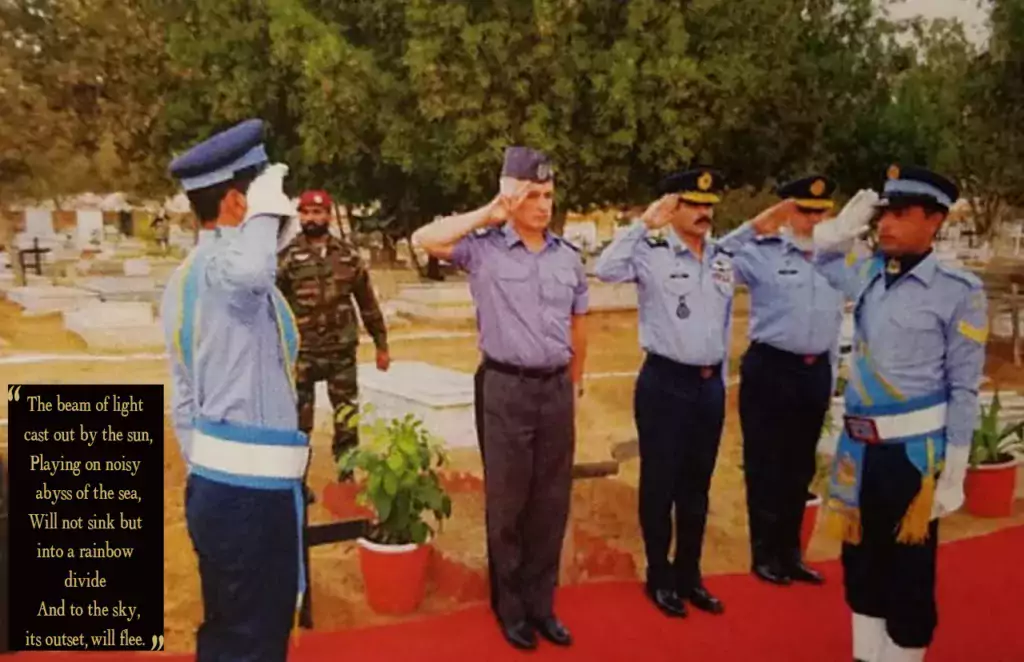
Turowicz left behind four children. Anna, Magda, Alicja and a son, Maerk. Two of his daughters got married to Pakistanis and one to a Physicist from Bangladesh. His son, Maerk had initial schooling from Karachi, later did Masters in Oceanography and Chemical engineering and got settled in England.
After World War II, Turowicz could easily have returned home. Instead the Polish officer found his calling in Pakistan, a country that was scraping together officers to build an effective air force. Not only he helped PAF in its early years but was also instrumental in developing the Pakistans’s space program. Turowicz’s commitment was total and for that he was honored with the highest decorations Pakistan could award him. A legend in his own time, a war hero, his biography reads more like fiction than fact – leaving a lasting impression in the history of his homeland that has not forgotten him.
